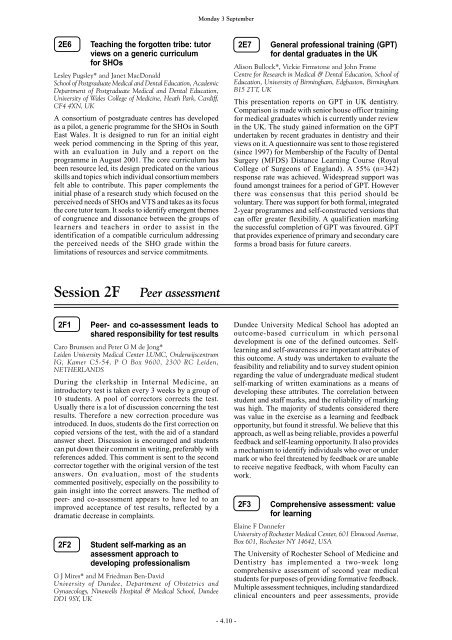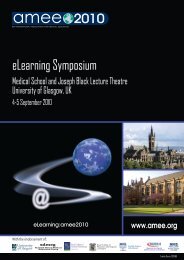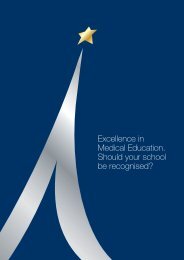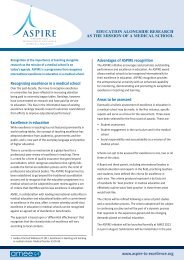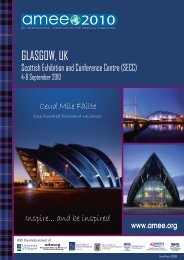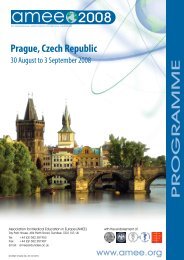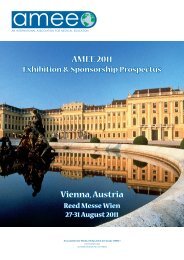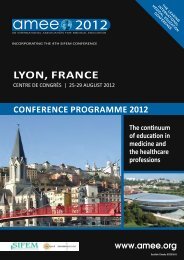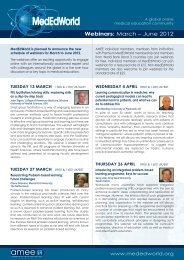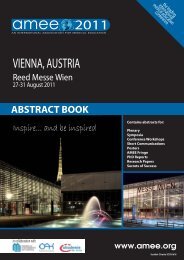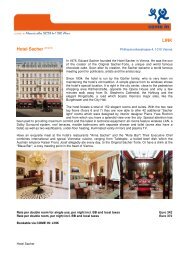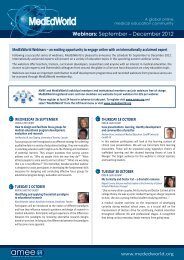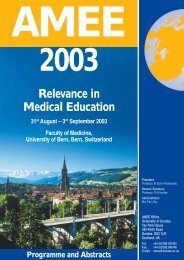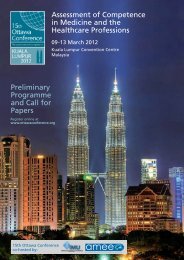AMEE Berlin 2002 Programme
AMEE Berlin 2002 Programme
AMEE Berlin 2002 Programme
Create successful ePaper yourself
Turn your PDF publications into a flip-book with our unique Google optimized e-Paper software.
2E6 Teaching the forgotten tribe: tutor<br />
views on a generic curriculum<br />
for SHOs<br />
Lesley Pugsley* and Janet MacDonald<br />
School of Postgraduate Medical and Dental Education, Academic<br />
Department of Postgraduate Medical and Dental Education,<br />
University of Wales College of Medicine, Heath Park, Cardiff,<br />
CF4 4XN, UK<br />
A consortium of postgraduate centres has developed<br />
as a pilot, a generic programme for the SHOs in South<br />
East Wales. It is designed to run for an initial eight<br />
week period commencing in the Spring of this year,<br />
with an evaluation in July and a report on the<br />
programme in August 2001. The core curriculum has<br />
been resource led, its design predicated on the various<br />
skills and topics which individual consortium members<br />
felt able to contribute. This paper complements the<br />
initial phase of a research study which focused on the<br />
perceived needs of SHOs and VTS and takes as its focus<br />
the core tutor team. It seeks to identify emergent themes<br />
of congruence and dissonance between the groups of<br />
learners and teachers in order to assist in the<br />
identification of a compatible curriculum addressing<br />
the perceived needs of the SHO grade within the<br />
limitations of resources and service commitments.<br />
Session 2F Peer assessment<br />
2F1 Peer- and co-assessment leads to<br />
shared responsibility for test results<br />
Caro Brumsen and Peter G M de Jong*<br />
Leiden University Medical Center LUMC, Onderwijscentrum<br />
IG, Kamer C5-54, P O Box 9600, 2300 RC Leiden,<br />
NETHERLANDS<br />
During the clerkship in Internal Medicine, an<br />
introductory test is taken every 3 weeks by a group of<br />
10 students. A pool of correctors corrects the test.<br />
Usually there is a lot of discussion concerning the test<br />
results. Therefore a new correction procedure was<br />
introduced. In duos, students do the first correction on<br />
copied versions of the test, with the aid of a standard<br />
answer sheet. Discussion is encouraged and students<br />
can put down their comment in writing, preferably with<br />
references added. This comment is sent to the second<br />
corrector together with the original version of the test<br />
answers. On evaluation, most of the students<br />
commented positively, especially on the possibility to<br />
gain insight into the correct answers. The method of<br />
peer- and co-assessment appears to have led to an<br />
improved acceptance of test results, reflected by a<br />
dramatic decrease in complaints.<br />
2F2 Student self-marking as an<br />
assessment approach to<br />
developing professionalism<br />
G J Mires* and M Friedman Ben-David<br />
University of Dundee, Department of Obstetrics and<br />
Gynaecology, Ninewells Hospital & Medical School, Dundee<br />
DD1 9SY, UK<br />
Monday 3 September<br />
- 4.10 -<br />
2E7 General professional training (GPT)<br />
for dental graduates in the UK<br />
Alison Bullock*, Vickie Firmstone and John Frame<br />
Centre for Research in Medical & Dental Education, School of<br />
Education, University of Birmingham, Edgbaston, Birmingham<br />
B15 2TT, UK<br />
This presentation reports on GPT in UK dentistry.<br />
Comparison is made with senior house officer training<br />
for medical graduates which is currently under review<br />
in the UK. The study gained information on the GPT<br />
undertaken by recent graduates in dentistry and their<br />
views on it. A questionnaire was sent to those registered<br />
(since 1997) for Membership of the Faculty of Dental<br />
Surgery (MFDS) Distance Learning Course (Royal<br />
College of Surgeons of England). A 55% (n=342)<br />
response rate was achieved. Widespread support was<br />
found amongst trainees for a period of GPT. However<br />
there was consensus that this period should be<br />
voluntary. There was support for both formal, integrated<br />
2-year programmes and self-constructed versions that<br />
can offer greater flexibility. A qualification marking<br />
the successful completion of GPT was favoured. GPT<br />
that provides experience of primary and secondary care<br />
forms a broad basis for future careers.<br />
Dundee University Medical School has adopted an<br />
outcome-based curriculum in which personal<br />
development is one of the defined outcomes. Selflearning<br />
and self-awareness are important attributes of<br />
this outcome. A study was undertaken to evaluate the<br />
feasibility and reliability and to survey student opinion<br />
regarding the value of undergraduate medical student<br />
self-marking of written examinations as a means of<br />
developing these attributes. The correlation between<br />
student and staff marks, and the reliability of marking<br />
was high. The majority of students considered there<br />
was value in the exercise as a learning and feedback<br />
opportunity, but found it stressful. We believe that this<br />
approach, as well as being reliable, provides a powerful<br />
feedback and self-learning opportunity. It also provides<br />
a mechanism to identify individuals who over or under<br />
mark or who feel threatened by feedback or are unable<br />
to receive negative feedback, with whom Faculty can<br />
work.<br />
2F3 Comprehensive assessment: value<br />
for learning<br />
Elaine F Dannefer<br />
University of Rochester Medical Center, 601 Elmwood Avenue,<br />
Box 601, Rochester NY 14642, USA<br />
The University of Rochester School of Medicine and<br />
Dentistry has implemented a two-week long<br />
comprehensive assessment of second year medical<br />
students for purposes of providing formative feedback.<br />
Multiple assessment techniques, including standardized<br />
clinical encounters and peer assessments, provide


